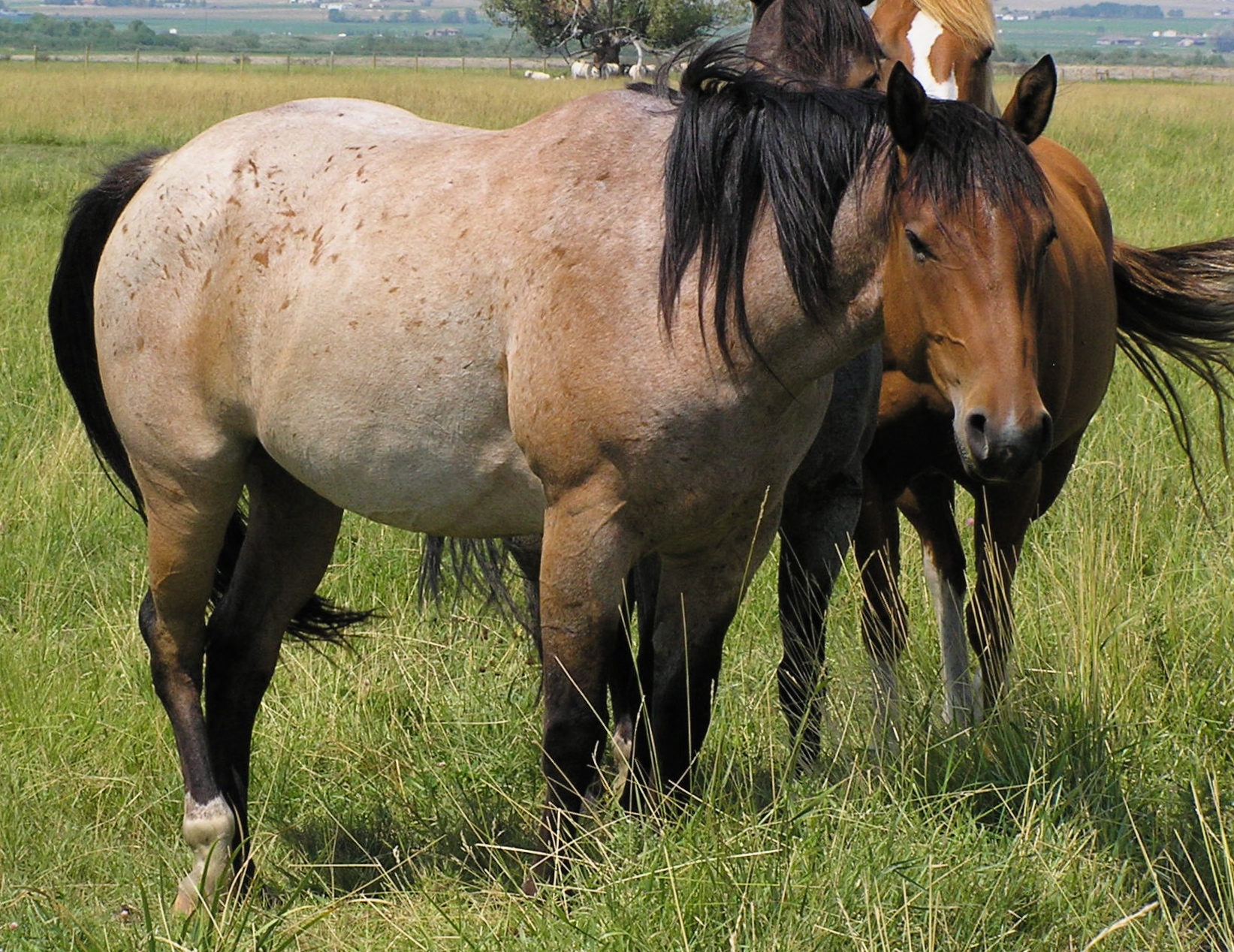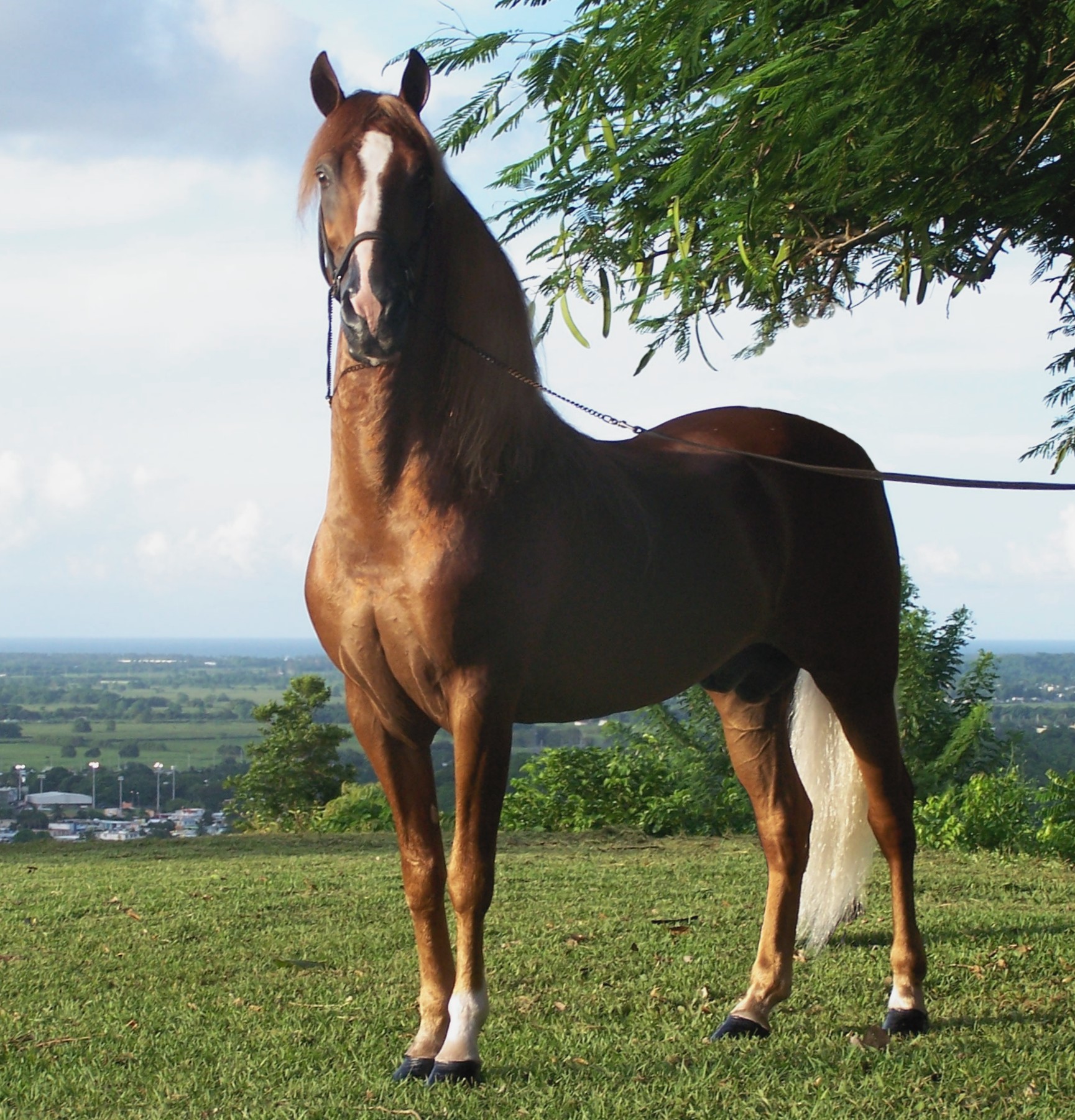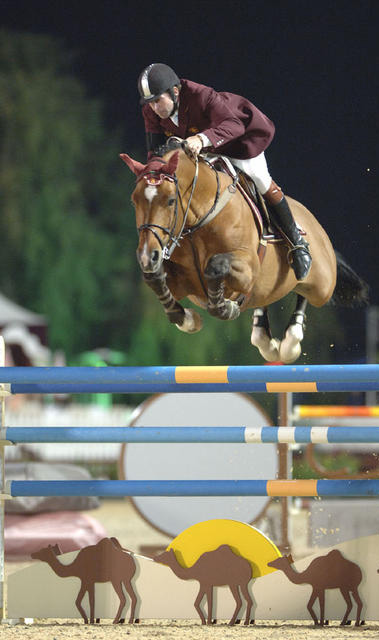|
Out On Parole (horse)
Out On Parole (1997–2018) was a Tennessee Walking Horse who won the World Grand Championship in the 2002 Tennessee Walking Horse National Celebration. Life and career Out On Parole was a black roan stallion with a white blaze on his face and a white sock on his left hind foot, sired by Pusher's Doing Time and out of the mare Pride's Golden Doll. He was foaled on March 25, 1997 and bred by Judy Moore of Shelbyville, Tennessee. He was sold to Bob Kilgore as a yearling, then sold to Pete Hammond, who sold him to Randall and Sadie Baskins. The Baskins owned him from his two-year-old year until his death. Out On Parole was trained by Bud Dunn and Son Stables of Florence, Alabama. Bud Dunn trained Out On Parole to canter, but as he was working with RPM, his second World Grand Champion at the time, his son Steve Dunn was Out On Parole's primary trainer. Steve Dunn rode Out On Parole in the 1999 Tennessee Walking Horse National Celebration The Tennessee Walking Horse National Ce ... [...More Info...] [...Related Items...] OR: [Wikipedia] [Google] [Baidu] |
Tennessee Walking Horse
The Tennessee Walking Horse or Tennessee Walker is a breed of gaited horse known for its unique four-beat running-walk and flashy movement. It was originally developed as a riding horse on farms and plantations in the American South. It is a popular riding horse due to its calm disposition, smooth gaits and sure-footedness. The Tennessee Walking Horse is often seen in the show ring, but is also popular as a pleasure and trail riding horse using both English and Western equipment. Tennessee Walkers are also seen in movies, television, and other entertainment. The breed was developed beginning in the late 18th century when Narragansett Pacers and Canadian Pacers from the eastern United States were crossed with gaited Spanish Mustangs from Texas. Other breeds were later added, and in 1886 a foal named Black Allan was born. He is now considered the foundation sire of the breed. In 1935 the Tennessee Walking Horse Breeders' Association was formed, and it closed the studbook in ... [...More Info...] [...Related Items...] OR: [Wikipedia] [Google] [Baidu] |
Tennessee Walking Horse National Celebration
The Tennessee Walking Horse National Celebration (TWHNC), sometimes known as the Celebration, is the largest horse show for the Tennessee Walking Horse breed, and has been held annually in or near Shelbyville, Tennessee since its inception in 1939. The Celebration was conceived by Henry Davis, a horse trainer who along with several other horsemen, felt the Shelbyville area should have a festival or annual event. Although the Celebration was originally held in Wartrace, Tennessee, it moved to Shelbyville, the seat of Bedford County, a few years later. The Celebration spans 11 days and nights in late August and early September annually, and finishes with the crowning of the World Grand Champion Tennessee Walker on the Saturday night before Labor Day. The TWHNC draws an estimated 2,000 horses and 250,000 spectators to Shelbyville each year. History The Tennessee Walking Horse National Celebration was founded in 1939. A Wartrace resident, Henry Davis, went to Winchester, Tennes ... [...More Info...] [...Related Items...] OR: [Wikipedia] [Google] [Baidu] |
Roan (color)
Roan is a coat color found in many animals, including horses, cattle, antelope, cat and dogs. It is defined generally as an even mixture of white and pigmented hairs that do not "gray out" or fade as the animal ages."''roan'', ''a''. and ''n.1''" Oxford English Dictionary. 2nd edition 1989. OED Online. Oxford University Press. 3 June 2008. . There are a variety of genetic conditions which produce the colors described as "roan" in various species. Roan horses A horse with intermixed white and colored hairs of any color is usually called a roan. However, such mixtures, which can appear superficially similar, are caused by a number of separate genetic factors. Identifiable types of roans include true or classic roan, varnish roan, and rabicano, though other currently unknown factors may be responsible for ambiguous "roaning." Gray horses, which become lighter as they age until their hair coat is nearly completely white, may be confused with roans when they are young. Duns, whic ... [...More Info...] [...Related Items...] OR: [Wikipedia] [Google] [Baidu] |
Stallion
A stallion is a male horse that has not been gelded (castrated). Stallions follow the conformation and phenotype of their breed, but within that standard, the presence of hormones such as testosterone may give stallions a thicker, "cresty" neck, as well as a somewhat more muscular physique as compared to female horses, known as ''mares'', and castrated males, called ''geldings''. Temperament varies widely based on genetics, and training, but because of their instincts as herd animals, they may be prone to aggressive behavior, particularly toward other stallions, and thus require careful management by knowledgeable handlers. However, with proper training and management, stallions are effective equine athletes at the highest levels of many disciplines, including horse racing, horse shows, and international Olympic competition. "Stallion" is also used to refer to males of other equids, including zebras and donkeys. Herd behavior Contrary to popular myths, many stallions do no ... [...More Info...] [...Related Items...] OR: [Wikipedia] [Google] [Baidu] |
Foal
A foal is an equine up to one year old; this term is used mainly for horses, but can be used for donkeys. More specific terms are colt for a male foal and filly for a female foal, and are used until the horse is three or four. When the foal is nursing from its dam (mother), it may also be called a "suckling". After it has been weaned from its dam, it may be called a "weanling". When a mare is pregnant, she is said to be "in foal". When the mare gives birth, she is "foaling", and the impending birth is usually stated as "to foal". A newborn horse is "foaled". After a horse is one year old, it is no longer a foal, and is a "yearling". There are no special age-related terms for young horses older than yearlings. When young horses reach breeding maturity, the terms change: a filly over three (four in horse racing) is called a mare, and a colt over three is called a stallion. A castrated male horse is called a gelding regardless of age; however, colloquially, the term "gelding col ... [...More Info...] [...Related Items...] OR: [Wikipedia] [Google] [Baidu] |
Shelbyville, Tennessee
Shelbyville is a city in and the county seat of Bedford County, Tennessee, United States. The town was laid out in 1810 and incorporated in 1819. Shelbyville had a population of 20,335 residents at the 2010 census. The town is a hub of the Tennessee Walking Horse industry and has been nicknamed "The Walking Horse Capital of the World". Geography Shelbyville is in Middle Tennessee on a Highland Rim limestone bluff upon the banks of Duck River, which flows around the southern and eastern sides of town. According to the United States Census Bureau, the city has a total area of , all land. Climate Demographics 2020 census As of the 2020 United States census, there were 23,557 people, 7,257 households, and 5,025 families residing in the city. 2000 census As of the census of 2000, there were 16,105 people, 6,066 households, and 4,155 families residing in the city. The population density was 1,041.3 people per square mile (402.0/km2). There were 6,550 housing units at an average ... [...More Info...] [...Related Items...] OR: [Wikipedia] [Google] [Baidu] |
Yearling (horse)
A yearling is a young horse either male or female that is between one and two years old.Ensminger, M. E. ''Horses & Tack: A Complete One Volume Reference on Horses and Their Care'' Rev. ed. Boston:Houghton Mifflin Co. 1991 p. 470 Yearlings are comparable in development to a very early adolescent and are not fully mature physically. While they may be in the earliest stages of sexual maturity, they are considered too young to be breeding stock. Yearlings may be further defined by sex, using the term "colt" to describe any male horse under age four, and filly for any female under four. Development and training Generally, the training of yearlings consists of basic gentling on the ground; most are too young to be ridden or driven. Yearlings are often full of energy and quite unpredictable. Even though they are not fully mature, they are heavier and stronger than a human and require knowledgeable handling. Many colts who are not going to be used as breeding stallions are gelded ... [...More Info...] [...Related Items...] OR: [Wikipedia] [Google] [Baidu] |
Florence, Alabama
Florence is a city in, and the county seat of, Lauderdale County, Alabama, United States, in the state's northwestern corner. It is situated along the Tennessee River and is home to the University of North Alabama, the oldest college in the state. Florence is the largest and principal city of the Florence-Muscle Shoals Metropolitan Statistical Area commonly known as "The Shoals" (which also includes the cities of Muscle Shoals, Sheffield, and Tuscumbia in Colbert County). Florence is considered northwestern Alabama's primary economic hub. Annual tourism events include the W. C. Handy Music Festival in the summer and the Renaissance Faire in the fall. Landmarks in Florence include the 20th-century Rosenbaum House, the only Frank Lloyd Wright-designed home located in Alabama. The Florence Indian Mound, constructed by indigenous people between 100 BCE and 400 BCE in the Woodland period, is the largest surviving earthen mound in the state and is 43 feet high. It is listed on th ... [...More Info...] [...Related Items...] OR: [Wikipedia] [Google] [Baidu] |
Bud Dunn
Emerson "Bud" Dunn (May 15, 1918 – January 11, 2001) was a Tennessee Walking Horse trainer from Kentucky who spent most of his career in northern Alabama. He trained horses for over forty years and won his first Tennessee Walking Horse World Grand Championship at age 74 with Dark Spirit's Rebel; at the time, he was the oldest rider to win the honor. He was inducted into the Tennessee Walking Horse Hall of Fame in 1987 and named trainer of the year in 1980 and 1991. In 1999 at age 81, Dunn surpassed his own record for the oldest winning rider by winning his second World Grand Championship, riding RPM. He died of a heart attack in January 2001. Life and career Dunn was born on May 15, 1918, in Scott County, Kentucky, near Lexington, the second child and only son of Lucius and Sadie Burgess Dunn. He was named Emerson but was generally known as "Bud". Horses played a large part in his early life, and he later said that he "came into the world around them". Dunn began training ... [...More Info...] [...Related Items...] OR: [Wikipedia] [Google] [Baidu] |
Canter
The canter and gallop are variations on the fastest gait that can be performed by a horse or other equine. The canter is a controlled three-beat gait, while the gallop is a faster, four-beat variation of the same gait. It is a natural gait possessed by all horses, faster than most horses' trot, or ambling gaits. The gallop is the fastest gait of the horse, averaging about . The speed of the canter varies between depending on the length of the horse's stride. A variation of the canter, seen in western riding, is called a lope, and is generally quite slow, no more than . Etymology Since the earliest dictionaries there has been a commonly agreed suggestion that the origin of the word "canter" comes from the English city of Canterbury, a place of pilgrimage in the Middle Ages, as referred to in ''The Canterbury Tales'', where the comfortable speed for a pilgrim travelling some distance on horseback was above that of a trot but below that of a gallop. However a lack of compelli ... [...More Info...] [...Related Items...] OR: [Wikipedia] [Google] [Baidu] |
RPM (horse)
RPM was a Tennessee Walking Horse who won a World Grand Championship in 1999. As a four-year-old, RPM was sold for $1.25 million, estimated at the time to be the highest price ever paid for a Tennessee Walking Horse. RPM was trained by Bud Dunn, who also trained the horse's sire to a World Grand Championship in 1992. Life and career RPM was a black stallion sired by Dark Spirit's Rebel, the 1992 World Grand Champion Tennessee Walking Horse, and out of Ebony's Emmy Lou. As a yearling, RPM was sold to Pete Hammond and Bob Kilgore for $100,000 and put in training with Bud Dunn of Florence, Alabama, who had also trained Dark Spirit's Rebel. Dunn showed RPM to the three-year-old World Championship at the 1997 Tennessee Walking Horse National Celebration and the four-year-old World Championship in 1998. The same year, RPM was entered in the open World Grand Championship and won reserve. Dunn was aiming RPM at the World Grand Championship the next year. However, in May 1999, RPM was sol ... [...More Info...] [...Related Items...] OR: [Wikipedia] [Google] [Baidu] |
Horse Show
A horse show is a judged exhibition of horses and ponies. Many different horse breeds and equestrian disciplines hold competitions worldwide, from local to the international levels. Most horse shows run from one to three days, sometimes longer for major, all-breed events or national and international championships in a given discipline or breed. Most shows consist of a series of different performances, called ''classes,'' wherein a group of horses with similar training or characteristics compete against one another for awards and, often, prize money. International organizations and competitions There are ten international disciplines run under rules established by the '' Fédération équestre internationale'' (FEI): *Combined driving * Dressage * Endurance riding *Eventing *Paraequestrianism (Paralympic equestrian sport for athletes with disabilities) *Reining *Show jumping *Tent pegging *Vaulting *Western Pleasure * Showmanship The rules of the FEI govern competitions open to ... [...More Info...] [...Related Items...] OR: [Wikipedia] [Google] [Baidu] |








